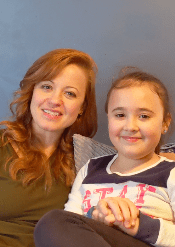

How is it different? Kids are remarkably, resilient by nature – especially military kids! Though their reactions to novel, scary situations will vary depending on the developmental level of the child, most kids are able to adapt to new circumstances. The innocence of children lends itself to a natural optimism that fuels their ability to persist with love and guidance from the adults around them.
What is the challenge? At the same time, children do not always have the language to express difficult feelings, especially younger children. Our new normal is scary for everyone and children have an extraordinary ability to tune into their environment and those around them, picking up on the feelings of fear and uncertainty we are experiencing. Also, as school encroaches on family space at home and the time between seeing cherished friends, family and school personnel grows longer, tensions rise. For young children, stress is often communicated through “acting out behaviors” such as throwing tantrums, disrupted sleep schedules and defiance. For older children who are able to process the situation, however, you may observe more “internalizing behaviors” such as isolating in the bedroom, excessive sleeping, and lack of communication.
What can you do?
-
Listen. Ask your kids how they are doing and resist the urge to assuage or explain their feelings to them. Communicate empathy through body language and use cues such as head nods to encourage opening up.
-
Limit the amount of news your kids are exposed to while providing factual, developmentally appropriate answers to their questions. For little ones, sometimes the best response is to acknowledge their feelings and explain that the grown ups are taking steps to keep everyone safe.
-
Provide structure – stick to as much of the previous routine as possible, i.e. bedtime, mealtimes etc., while creating new schedules to address schooling, play and exercise. Have a plan in place while allowing for flexibility when everyone simply needs a break.
-
Get outside (safely – if you can) and exercise together! The strategies you utilize to care for yourself are effective for children too, so try some mindfulness meditation while you are at it!
-
Schedule family time every day. Take this opportunity to establish regular family meals and game night.
-
If able, assist your kids in reaching out to friends and other trusted adults in their life – you may even let them show you how to video chat with someone 😉
-
Homeschooling is hard. Set up a schedule of tasks you children can follow independently and build in breaks. Contact your child’s teacher whenever necessary and access free resources for military kids like tutor.com to help you along.
-
Lastly, have compassion for yourself and your children – none of this is easy!
Resources
Military OneSource
-
Resources for Children and Youth: https://www.militaryonesource.mil/education-employment/for-children-and-youth/for-children-and-youth-resources
-
National Guard Youth and Family Programs: https://www.militaryonesource.mil/national-guard/national-guard-family-program
Massachusetts National Guard
-
Massachusetts National Guard Family Program: https://massnationalguard.org/index.php/resources/family-programs.html
Distance learning
-
WGBH Distance Learning: https://www.wgbh.org/distance-learning-center/3-5
-
National Geographic Kids www.kids.nationalgeographic.com
-
Art for Kids Hub: https://www.artforkidshub.com/
Mindfulness
Exercise (and fun)
-
GoNoodle (for indoor exercise & fun): https://www.gonoodle.com/
-
Giant list of things to do at home: https://docs.google.com/document/u/0/d/1o6kEgCKLn3cyIm2hehhhSTIk7yRTd0C3zx49JS4wwCI/mobilebasic?fbclid=IwAR2fF5JjiKGzBWeS3iHzrVMuqmaCQIr8DQdd7zjouaAoWdtnzjiLr8zyy8o
Working from home
-
Yale Tips for working from home with kids: https://www.yalemedicine.org/stories/8-tips-work-at-home-with-kids-covid-19/
